
H2Open Journal
Scope & Guideline
Unlocking insights in water technology and management.
Introduction
Aims and Scopes
- Water Quality Assessment and Management:
A core focus on evaluating and improving water quality through various methodologies, including chemical, biological, and physical assessments. - Sustainable Water Resource Management:
Research aimed at developing strategies for the sustainable use and management of water resources, particularly in response to climate change and urbanization. - Innovative Treatment Technologies:
Exploration of novel technologies and materials for water treatment, including bioremediation, phytoremediation, and advanced filtration techniques. - Hydrological Modeling and Analysis:
Utilization of hydrological models to predict water flow, sediment transport, and the impacts of land use changes on water systems. - Community Engagement and Governance:
Studies on the socio-political aspects of water governance, including community participation, policy analysis, and the impact of interventions on local populations.
Trending and Emerging
- Impact of Climate Change on Water Resources:
Research addressing the implications of climate change on water availability, quality, and management practices is increasingly prominent, highlighting the urgent need for adaptive strategies. - Integrated Water Resource Management (IWRM):
There is a growing trend towards studies that promote IWRM approaches, emphasizing the interconnectedness of water, land, and ecosystem services for sustainable development. - Use of Advanced Technologies in Water Treatment:
Emerging research on the application of advanced materials and technologies, such as nanotechnology and machine learning, for improving water treatment processes and efficiency. - Community-Based Water Management Solutions:
An increase in studies that explore community engagement and participatory approaches in water governance, reflecting a shift towards empowering local populations in water management. - Phytoremediation and Bioremediation Strategies:
Research focusing on the use of plants and microorganisms for the remediation of contaminated water sources is gaining traction, showcasing sustainable and low-cost solutions for water pollution.
Declining or Waning
- Traditional Water Supply Systems:
Research on conventional water supply systems has decreased, possibly due to a greater emphasis on innovative and sustainable alternatives such as decentralized systems and nature-based solutions. - Static Water Quality Monitoring:
There is a noticeable decline in studies focused solely on static assessments of water quality, as the field moves towards more dynamic and integrated approaches that consider temporal variations and predictive modeling. - Single Contaminant Studies:
The focus on individual contaminants has waned as researchers increasingly adopt a holistic view of water quality, addressing multiple contaminants and their interactions in complex ecosystems.
Similar Journals

Water Practice and Technology
Championing Sustainable Practices in Water ScienceWater Practice and Technology is a distinguished open-access journal published by IWA PUBLISHING, dedicated to disseminating cutting-edge research and practical insights within the field of water science and technology. With an E-ISSN of 1751-231X, the journal has been at the forefront of sharing knowledge since its inception in 2011 and has transitioned to open access in 2021, providing unrestricted access to high-quality research articles. Based in the United Kingdom, this journal plays a vital role in advancing the understanding of water resource management, treatment technologies, and environmental sustainability. As of 2023, it is categorized in the Q3 quartile for Water Science and Technology with a Scopus rank of #157/261, placing it in the 40th percentile among its peers. Researchers, professionals, and students alike will find the journal a valuable resource for the latest trends, innovations, and practical applications in the water sector, facilitating a collaborative approach towards addressing global water challenges.
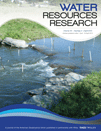
WATER RESOURCES RESEARCH
Empowering Knowledge in Water Resource ScienceWATER RESOURCES RESEARCH, published by the American Geophysical Union, stands as a premier journal in the field of environmental science, specifically within the domain of water science and technology. With an impressive impact factor and a categorical ranking of Q1 for 2023, it ranks within the top 10% of relevant journals, evidencing its critical role in advancing the knowledge and application of water resources research. Since its inception in 1965, the journal has been dedicated to rigorous research that addresses pressing global challenges related to water resource management, hydrology, and environmental sustainability. The journal's comprehensive publication scope aims to present innovative findings and methodologies that can shape effective policies and practices. Although it does not offer open access, the robust research it publishes continues to influence academics and practitioners alike, ensuring its position as an essential resource for anyone engaged in the pursuit of water-related knowledge and solutions.
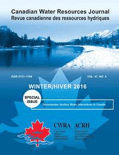
Canadian Water Resources Journal
Leading the charge in water resources innovation.Canadian Water Resources Journal, published by Taylor & Francis Inc, is a leading academic journal dedicated to the field of water science and technology. With a significant history dating back to its inception in 1976, the journal offers a platform for high-quality, peer-reviewed research that addresses critical issues in water resources management, hydrology, water quality, and policy. The journal is recognized for its valuable contributions to the field, exemplified by its classification in the Q2 category for Water Science and Technology and holding a respectable rank of #137 out of 261 in the Scopus Environmental Science category. While it does not currently offer open access, its articles remain accessible through various institutional subscriptions, ensuring that professionals, researchers, and students stay updated with the latest advancements and discussions in water resources. As it converges towards its ongoing publication commitment through 2024, the Canadian Water Resources Journal remains an essential resource for those engaged in the pursuit of sustainable water management solutions.

RBRH-Revista Brasileira de Recursos Hidricos
Exploring the Depths of Water Resource ResearchRBRH-Revista Brasileira de Recursos Hidricos is a leading peer-reviewed journal dedicated to the dissemination of high-quality research in the field of water resources, published by the Associação Brasileira de Recursos Hídricos (ABRH). With both ISSN 1414-381X and E-ISSN 2318-0331, this journal has established itself as an essential resource since its transition to Open Access in 1996, fostering widespread accessibility to vital research findings. Based in Brazil, the journal serves a global audience, embodying a commitment to the study and management of aquatic systems, including their dynamics and technological solutions. As part of its rigorous academic contributions, it has achieved Q3 rankings across categories such as Aquatic Science, Earth-Surface Processes, Oceanography, and Water Science & Technology, reflecting its impact and relevance in these domains. Researchers, professionals, and students are encouraged to engage with the journal's diverse array of studies from 2016 to 2024, consolidating knowledge on crucial water resource challenges and innovations.

Water
Championing high-quality research for a water-secure world.Water, an esteemed journal published by MDPI, serves as a pivotal resource for global research in the fields of aquatic science, biochemistry, geography, and water science and technology. Since its inception in 2009, this open-access journal has committed itself to advancing knowledge regarding water-related topics by fostering a platform that encourages the dissemination of high-quality research. With its impressive impact factor reflecting its relevance and influence, Water ranks in the top quartiles in various categories, including Q1 in Aquatic Science and Water Science and Technology, showcasing its commitment to publishing cutting-edge findings that resonate deeply with the environmental and biological sciences community. Located in Basel, Switzerland, the journal prioritizes accessibility for researchers, professionals, and students alike, aligning with the broader scientific goal of addressing urgent water challenges through collaborative and interdisciplinary research.
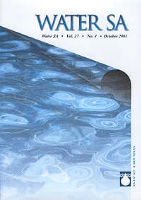
WATER SA
Transforming research into actionable insights for water resource management.WATER SA, published by the WATER RESEARCH COMMISSION, serves as a pivotal platform for interdisciplinary research in the areas of water science and technology. With an ISSN of 0378-4738 and an E-ISSN of 1816-7950, this open-access journal has been committed to disseminating knowledge since 2005, ensuring that research is freely accessible to a global audience. As of 2023, it holds a Q3 ranking in several key categories including Applied Microbiology and Biotechnology, Management, Monitoring, Policy and Law, Waste Management and Disposal, and Water Science and Technology. These rankings reflect its significant contribution to these disciplines, particularly in South Africa where it is based. With a history dating back to 1976 and converging research efforts extending through 2024, WATER SA aims to illuminate pressing water-related challenges and foster innovative solutions through rigorous scientific inquiry. Researchers, professionals, and students interested in the sustainability and management of water resources will find its comprehensive portfolio essential for advancing their work and understanding in an increasingly critical field.
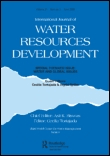
INTERNATIONAL JOURNAL OF WATER RESOURCES DEVELOPMENT
Exploring innovative research in water resource management.The INTERNATIONAL JOURNAL OF WATER RESOURCES DEVELOPMENT, published by ROUTLEDGE JOURNALS, TAYLOR & FRANCIS LTD, stands as a premier platform for disseminating cutting-edge research in the fields of water resources management and sustainable development. With an impressive impact factor indicated by its Q1 ranking in both Development and Water Science and Technology categories, this journal is pivotal for researchers and professionals seeking to advance their understanding of water-related challenges and solutions. Covering a broad spectrum of topics, it features contributions from leading experts, making it an essential resource for both academic inquiry and practical application. Although it does not currently offer Open Access, the journal's rigorous peer-review process ensures high-quality scholarship from 1983 to the present, reinforcing its role in shaping policies and practices globally. The journal is indexed in Scopus with notable rankings in Social Sciences and Environmental Science, highlighting its influence and reach within these vital sectors.

Journal of Water Management Modeling
Exploring Advanced Modeling Techniques in Water ScienceThe Journal of Water Management Modeling, published by COMPUTATIONAL HYDRAULICS INT, stands as a pivotal resource in the fields of Civil and Structural Engineering, Geography, Planning and Development, and Water Science and Technology. With an ISSN of 2292-6062, this Canadian-based journal has earned its reputation by exploring innovative modeling approaches to enhance water management, crucial in addressing today's environmental challenges. Despite its current Q3 status in Civil and Structural Engineering and Water Science categories, alongside a respectable Q2 rank in Geography, the journal is committed to advancing knowledge and fostering collaboration among researchers, practitioners, and students passionate about the sustainable management of water resources. The journal operates on an open-access model, ensuring research is readily available to a broad audience, and has converged its editorial focus from 2018 to 2024, continuously adapting to emerging trends and technologies within the discipline. As a part of the global conversation regarding effective water management, it plays a vital role in informing policies and practices that impact communities and ecosystems alike.
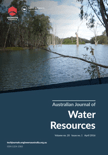
Australasian Journal of Water Resources
Pioneering Research in Water Science and TechnologyThe Australasian Journal of Water Resources, published by Taylor & Francis AS, stands as a pivotal resource in the field of water science and technology. With an ISSN of 1324-1583 and E-ISSN 2204-227X, this esteemed journal facilitates the dissemination of high-quality research articles that address critical issues facing water resources management across Australasia and beyond. Ranking in the Q2 category for Water Science and Technology as per the 2023 metrics, it boasts an impressive Scopus ranking of 75/261 in Environmental Science, placing it in the 71st percentile for its field. Spanning from 2008 to 2024, the journal emphasizes the importance of sustainable water practices, innovative technologies, and environmental policy, making it an invaluable asset for researchers, professionals, and students seeking to advance their knowledge and contribute to the discourse on water management challenges. The journal's rigorous peer-review process and commitment to open academic dialogue ensure that emerging trends and pioneering ideas receive the attention they deserve.
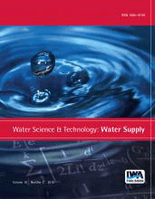
Water Supply
Elevating the discourse on water resources.Water Supply is an esteemed journal published by IWA PUBLISHING that plays a pivotal role in the field of water science and technology. With an ISSN of 1606-9749 and an E-ISSN of 1607-0798, this journal has been a key resource for researchers and professionals since its inception in 2001. Now covering a wide range of topics until 2024, it is recognized for its impactful contributions, holding a Q2 ranking in the Environmental Science: Water Science and Technology category, and currently stands at rank #125 out of 261 in Scopus, reflecting its relevance and influence in the academic community. The journal aims to disseminate significant research findings and innovations in water supply management, ensuring that professionals and students are equipped with the latest knowledge and practices in the sector. Despite not being an open-access journal, Water Supply continues to attract high-quality submissions that enhance our understanding and preservation of vital water resources. For those invested in sustainable water practices, this journal is an invaluable tool for continued learning and advancement.